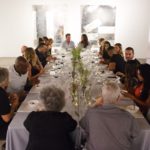Popping Up

Writer Fadi Sitto
Photography Courtesy of Sofar Sounds, Designer Treasure Hunt, POP PHX and 319 Hidden Kitchen
[dropcap]N[/dropcap]ow you see it; now you don’t.
It was Lima, Peru 2010. I was pretty much inhaling mouthwatering, made-from-scratch authentic empanadas on a street corner with a local I’d just met. A few minutes earlier, we’d been standing in a line in front of a tiny make-shift outdoor booth about 20 people deep, for what I was promised were the best empanadas I would ever eat in my life.
The empanadas were so ridiculously good that, even before I finished my first one, I told my new friend that I was coming back the next day for lunch and dinner. She rolled her eyes and smiled, then explained that I wouldn’t be able to get an empanada the next day, not from this place, not from the renegade Lima chef named Eduardo.
Eduardo was one of several chefs who visited neighborhoods all over the city of Lima to set up his pop-up food stand for exactly—and only—five and one half hours. The only way to know the exact location and time of his next pop-up empanada booth was to be invited by word of mouth.
Needless to say, I was somewhat bummed out, but at the same time exhilarated to realize that I had just experienced my first pop-up.
A pop-up is a temporary shop, market front, event or experience that may last 30 minutes, a day or even a month. Sometimes these pop-ups are invite-only, sometimes they are spontaneous and sometimes they are well-oiled marketing-curated events. Pop-ups typically rely on word of mouth to gain momentum.
These temporary limited experiences could include pop-up art exhibitions, pop-up yoga or even a pop-up beach resort. There’s a pop-up for everything. The most common pop-ups are related to dining, fashion and retail.
The pop-up concept is nothing new. According to historians, the actual origins date back to the ancient open-air markets along the silk roads in Persia, as well as Egypt, Greece and the Far East.
The “modern” pop-up concept dates back to at least the 14th century to the Vienna December Market. The rest of Europe caught up to Vienna in the decades that followed with short term marketplaces sprouting up in Paris, London and all over Germany in their respective city’s Christmas and farmers’ markets.
In more recent times, the more culturally revised pop-up phenomenon has roots in the United States, popping up first in Los Angeles and then New York in the late 1990s. The term “pop up” originated in the urban dictionary landscape back in 1999.
The pop-up movement we see today began to really take shape about 2008, after the financial crisis. There was an overabundance of vacant storefronts from coast to coast and everywhere in between.
The distressed landlords of those over saturated commercial buildings and venues began to make short term rentals readily available to anyone that wanted to sell their wares, their food and their ideas.
It’s estimated that $22 billion is spent globally on short term, temporary pop-up retail marketplace events around the world. Approximately $8 billion of that is here in the United States.
The pop-up experience is particularly appealing because of the limited time they’re open, the secretive impromptu nature, and the fear of missing out on something amazing.
In recent years, the Phoenix metro area has become a national trend setter for the homegrown non-corporate, non-big box pop-ups scene. This trend has gained warp-speed traction in the last few years, thanks to the many innovative local people here.
Sofar Sounds
One such unique entity that raises the volume of the pop-up scene here in Phoenix is Sofar Sounds.
The term “Sofar” derives from an acronym for “sounds from a room.” Sofar Sounds brings intimate, live concert performances to small audiences in comfortable spaces. They’ve even held a show in the penthouse of the tallest residential building in Phoenix. The location, time and musical lineup are usually not announced until 48 hours before the Phoenix Sofar shows. Their shows routinely sell out.
This one-of-a-kind pop-up concert organization was founded in 2009, and the Phoenix branch was established in 2015. Sofar Sounds currently has operations in over 400 cities around the world.
“We operate almost entirely off of the kindness of music lovers and volunteers. It’s awesome to see so many people open their homes and essentially let us throw a party. Of course, we clean up,” says Cole Pischke, city leader at Sofar Sounds Phoenix.
Design Treasure Hunt
When it comes to anything fashion, Orange County transplant Crystal Daniels, founder of Design Treasure Hunt based out of Phoenix has you covered.
Designer Treasure Hunt is a pop-up style shopping event-business that gives people a fun and stylish way to shop. The curated collections of new and gently worn designer clothing, shoes and handbags are priced at a fraction of the original retail cost.
Crystal has a background as a personal shopper and stylist, so there is a personal stylist experience built into Designer Treasure Hunt’s pop-up events. The unique opportunity for fashion lovers to shop quality second-hand designer goods without having to do the all the leg work themselves is a main reason why Designer Treasure Hunt is so popular.
POP PHX
Need a place to show the world your stuff? Located in the hip Roosevelt district of Downtown Phoenix, you’ll find a supportive and inspiring pop-up marketplace known as POP PHX.
POP PHX is a grassroots retail pop-up initiative that was established in the summer of 2017. The POP PHX vision was to showcase local Arizona merchants, create unique retail experiences and to support local artisans.
“The mission of POP PHX is to support independent retail entrepreneurs by providing a venue to gain exposure to a new customer base. As a community of small business owners, we work collectively to cultivate a shopping experience that is interesting, unique and a place that inspires,” she explains.
Ashley Bourget, founder of POP PHX decided to open up a brick and mortar shop dedicated to hosting pop-up events after hosting similar summer events in vacant retail spaces. Now, POP PHX on Roosevelt Row hosts numerous Arizona vendors.
319 Hidden Kitchen
Pop-up dining is the practice of eating at temporary restaurants or unique settings. Quite possibly the fastest growing genre in the pop-up industry the pop-up dining model involves innovative restaurateurs that hold one time dining experiences showcasing their culinary craft.
Do you want to make a lasting impression on a first date? 319 Hidden Kitchen is one such pop-up based here in Phoenix that just might be the way to make your future significant other’s heart pop up.
This secret supper club has no fixed location and the menu changes weekly. If you’re open to dining amongst new friends and enjoy modern cuisine, 319 Hidden Kitchen should be on your bucket list of pop-up experiences.
Timing is everything. With the combination of social media, local and large brands wanting more of a presence, we’re likely to see more pop-ups popping up. The pop-up way of life is entrenched in our culture, and more and more people are craving a personal customized experience.
sofarsounds.com/phoenix
@designertreasurehunt
popphx.com
319hiddenkitchen.com




